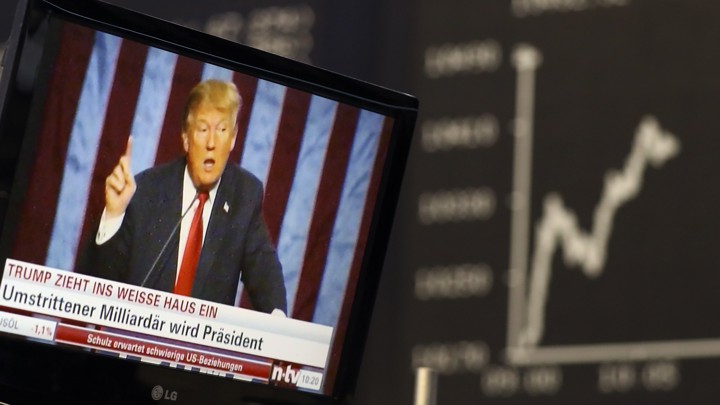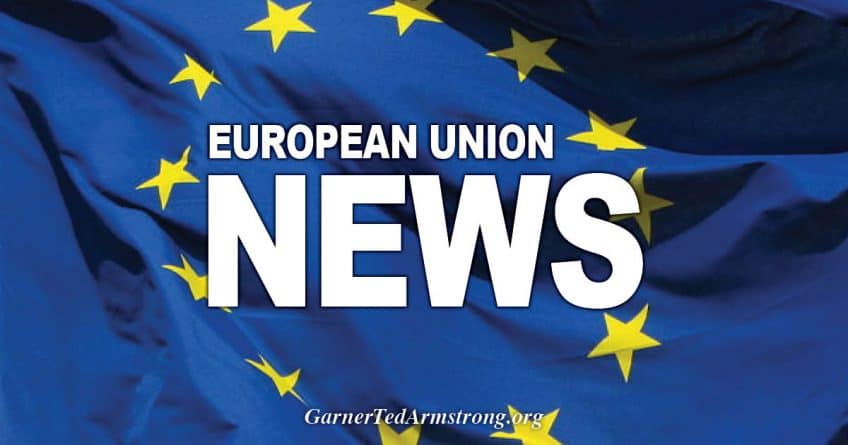“Right now we have almost-daily U.S. coverage on Trump and everything that’s connected to him.”

Europeans had trained a close eye on Trump long before the midterms. President Trump is pictured on a TV screen in Frankfurt, Germany, on November 9, 2016.KAI PFAFFENBACH / REUTERS
“The very character of our nation is on the ballot on Tuesday,” Joe Biden, the former vice president, said in his final pitch to voters Monday ahead of the U.S. midterm elections. “The rest of the world is looking.”
And the rest of the world is looking. Though the midterms are usually shrugged off by international audiences, who tend to focus more on U.S. presidential contests, this year is different. For those watching abroad, the midterms are as much about the presidency itself as they are about the statewide races that will determine the makeup of the next U.S. Congress. “Many outside the U.S. see the midterms as a referendum on President Trump and his policies,” said Marianne Schneider-Petsinger, a transatlantic specialist at the London-based think tank Chatham House. “They view the outcome of the election as a critical indicator of the direction of the U.S.”
Europeans had trained a close eye on Trump long before the midterms. From the explosive release of the White House tell-all Fire and Fury to the global spectacle of the Brett Kavanaugh hearings, there has been an
ongoing effort to parse this president’s behavior. That is particularly true in Europe, where American allies such as the United Kingdom, France, and Germany fear the next two years of the Trump presidency could open up an even greater rift in transatlantic relations.
In the U.K., where midterm coverage has dominated the front pages of major newspapers and websites in the run-up to the vote, the public seems to be paying more attention than it did in previous midterm elections. On the eve of the vote, approximately 300 people filled a conference hall in Westminster to watch a two-hour debate, hosted by Intelligence Squared, on what the election outcome will mean for the Trump presidency. Panelist Timothy Snyder, an American historian and author, told attendees that overseas interest is about more than palace intrigue.
“Whether you’re looking at it from Poland or Hungary or Germany or Austria or Russia or Ukraine, everyone else sees things that they recognize,” Snyder said, noting nationalist populist surges across the globe. “The things we do in America affect what people do in the rest of the world, whether we see it or whether we don’t see it.”
The midterms are also being closely watched in France, where coverage has emphasized that the vote is a crucial indicator of Trump’s popularity. “Trump’s Record to Be Tested at the Polls,” ran the lead headline in the November 6 edition of Le Monde, the French center-left daily. The newspaper has dedicated an entire online vertical to the midterms in recent weeks, offering extensive coverage on Trump’s immigration rhetoric. It has focused on the racial dynamics underpinning certain contests—for instance, it described Lauren Underwood, who is running in Illinois’ 14th Congressional District, as “a Black Candidate in a White Area.” The paper also interviewed Trump supporters across the Midwest and the West Coast and said these voters’ greatest fear was “that white men would lose their dominance.”
Adam Serwer: Trumpism is ‘identity politics’ for white people.
In Italy, where the populist government has certain ideological affinities with Trump, some coverage has explored how the midterms could affect Europe, where immigration has also become a defining issue—not least in elections for the European Parliament next May. Those elections will pit candidates espousing greater European integration against populists who want more national sovereignty, especially on issues such as immigration.
“If not even Trump’s hard line on immigration and the environment and his machismo will spur a real mobilization for the Democrats, the path toward 2020 will be even more difficult,” Massimo Gaggi, who covers the United States for Corriere della Sera, Italy’s leading daily, wrote on Tuesday in a front-page piece titled “A Message for Europe From the United States.”
In Germany, the media’s coverage of the midterms has been as frequent and intense as its coverage of the Trump presidency more broadly. Though German news organizations always covered U.S. elections and political news, the Trump era has spurred a more granular focus on what’s happening in Washington, from Trump’s White House to the top-tier congressional candidates whose victories could weaken the president.
“Trump both fascinates and scares most Germans, and the media reflect that,” said Mathieu von Rohr, the deputy foreign editor at the German newsweekly Der Spiegel. “Interest in the 2018 midterms is considerably higher in Germany than in earlier years … We and other German media did stories on the midterms during the Obama years, but not at the same magnitude.”
On Tuesday, the lead image on the cover of Munich’s Süddeutsche Zeitung, which is running an election live blog, showed Texas’s Beto O’Rourke with the headline “Hope for a Victory.” O’Rourke was also featured front and center on the website of the Frankfurter Allgemeine Zeitung, under the headline “The Most Expensive Midterm Elections Ever Come to a Close.” On Spiegel’s website Tuesday morning, the first five stories—including its leading story, “Battle for America”—were about different aspects of the midterms. The Hamburg-based newspaper Die Zeit asked in a story at the top of its home page, “What if the polls are wrong again?” And Tagesschau, Germany’s main nightly news program from broadcaster ARD, offered online coverage on “why the U.S. midterms are so important.”
“Seldom have the Germans watched American congressional elections with such excitement as they have in recent weeks,” read a front-page op-ed in the Berlin newspaper Der Tagesspiegel. “How will U.S. voters decide?”
Anna Sauerbrey, Der Tagesspiegel’s deputy editor in chief (who traveled to Iowathis fall to report on the midterms), said coverage of November’s contests is “in line with an overall raised interest” in U.S. politics since Trump’s rise. “Right now we have almost-daily U.S. coverage on Trump and everything that’s connected to him,” she said.
Even though Trump doesn’t feature on the ballot in the midterm elections, as far as many Europeans are concerned, he is very much the subject of the vote.
We want to hear what you think about this article. Submit a letter to the editor or write to letters@theatlantic.com.
Source: https://www.theatlantic.com/international/archive/2018/11/europeans-midterm-elections/575029/
[Disclaimer]









